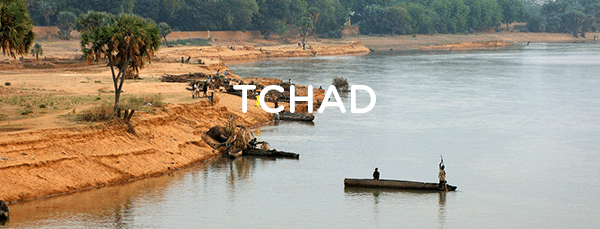|
| |
L’actualité de ces deux dernières semaines a été marquée par de graves affrontements entre éleveurs et agriculteurs dans la province du Moyen-Chari. Les violences, provoquées par la mort accidentelle d’un berger, ont causé la mort d’au moins 15 personnes et entraîné des affrontements de plusieurs jours entre les communautés. Dans le reste de l’actualité, une manifestation ayant pour objectif de préserver leur droit coutumier à Abéché a été durement réprimée par les forces de sécurité gouvernementales. Les organisations de la société civile parlent d’au moins 21 morts, et de 80 blessés. Le gouvernement a rétabli les règles coutumières précédemment appliquées. Néanmoins, selon des observateurs, la situation risque de s’aggraver, avec notamment le sentiment de stigmatisation subi par les populations originaires du Ouaddaï. Par ailleurs, un important dialogue pour la paix devrait se tenir à la fin du mois de février en présence du chef rebelle. À défaut de pouvoir être représentées, certaines organisations de la société civile demandent la médiation d’organisations religieuses, notamment proches du Vatican.
The news of the past two weeks has been marked by serious clashes between herders and farmers in Moyen-Chari province. The violence, sparked by the accidental death of a shepherd, resulted in the death of at least 15 people and several days of clashes between the communities. In other news, a demonstration to preserve an aspect of community law in Abeche was severely repressed by government security forces. Civil society organizations reported that at least 21 people were killed and 80 injured. The government has reinstated the customary rules previously applied, but observers say the situation is likely to worsen, particularly with the stigmatization of the Ouaddaï population. In addition, an important peace dialogue is scheduled to take place at the end of February in the presence of the rebel leader. In the absence of representation, some civil society organizations are requesting mediation by religious organizations, particularly those close to the Vatican.
|
|
|
|
| |
L'info phare - Source médiatique
|
|
|
|
| |
|
Au moins 15 morts lors d’affrontements intercommunautaires entre éleveurs et agriculteurs dans le sud du pays
Un conflit entre communautés d’éleveurs et d’agriculteurs a causé la mort d'au moins 15 personnes à Sandana dans la province du Moyen-Chari. Le conflit a démarré à la suite de la découverte du corps d’un berger à côté de sa moto en pleine brousse, à proximité de Sandana. L’enquête menée par les autorités locales a conclu qu’il s’agissait d’un accident. Toutefois, la communauté d’éleveurs du défunt a accusé les agriculteurs de Sandana d’assassinat. Dès le 9 février, une expédition punitive a été menée contre le village, donnant lieu à des tirs et à des affrontements à l’arme blanche. En août 2019, dans le même village, un conflit comparable avait fait plusieurs morts et blessés. Différentes organisations de la société civile comme la Commission Nationale des Droits de l’Homme (CNDH) ou la Convention tchadienne de défense des droits de l'Homme (CTDDH) ont dénoncé ces conflits.
|
|
At least 15 dead in intercommunal clashes between herders and farmers in the south of the country
A conflict between herder and farmer communities killed at least 15 people in Sandana in Moyen-Chari province. The conflict began after the body of a herder was found in the bush next to his motorcycle near Sandana. The investigation conducted by local authorities concluded that the body was an accident, but the deceased's herding community accused the Sandana farmers of murder. As early as February 9, a punitive expedition was carried out against the village, resulting in shootings and clashes with knives. A comparable conflict had left several people dead and injured in August 2019 in the same village. Various civil society organizations such as the National Human Rights Commission (CNDH) or the Chadian Convention for the Defense of Human Rights (CTDDH) are worried about those conflicts.
|
|
|
|
|
|
| |
|
Au moins 21 morts, 80 blessés et 200 arrestations en marge d’une manifestation organisée à Abéché contre le changement du droit coutumier
Au moins 21 manifestants sont morts au cours d’une manifestation à Abéché, à l’est du pays. Selon les organisations de défense des droits de l’homme, le bilan de cette manifestation compte 80 blessés et plus de 200 arrestations. Cette dernière a été organisée pour protester contre l'intronisation du chef de canton de Bani Halba. Les manifestants considèrent que ce nouveau canton ne respecte pas les règles coutumières et qu'il empiète sur des cantons déjà existants. Pour apaiser la situation, deux chefs traditionnels ont été suspendus de leurs fonctions. Les réseaux mobiles et internet sont coupés dans la ville, et les boutiques et les écoles sont restées fermées plusieurs jours. Les associations de défense de droits de l’homme au Tchad disent craindre une montée des violences.
|
|
At least 21 dead, 80 injured and 200 arrested on the sidelines of a demonstration in Abeche against changing customary law
At least 21 protesters died during a demonstration in the eastern city of Abeche. According to human rights organizations, the demonstration also resulted in 80 injuries and more than 200 arrests. The demonstration was organized to protest the enthronement of the new canton chief of Bani Halba, a new canton that demonstrators said did not respect customary rules and encroached on existing cantons. To calm the situation, two traditional leaders were suspended from their duties. Cell phone and internet networks were cut off in the city, and stores and schools remained closed for several days. Human rights groups in Chad said they feared a rise in violence.
|
|
|
|
|
|
| |
|
La violente répression contre les manifestants d’Abéché pourrait dégénérer en crise au sein des communautés du Ouaddaï
Dans l'est du pays, à Abéché, au moins 21 personnes ont été tuées par les forces de l’ordre alors qu’elles protestaient contre l'intronisation du chef de canton de Bani Halba. À N’Djamena, la capitale tchadienne, les événements d'Abéché ont des répercussions sur le quotidien des habitants. Dans plusieurs quartiers de N’Djamena, toutes les boutiques tenues par des commerçants originaires de la province du Ouaddaï sont fermées. Ces citoyens originaires de l’est du pays estiment que le gouvernement et l’armée ne font pas leur travail. Ils craignent un acharnement de la part du gouvernement de transition. Le 3 février, une délégation ministérielle a signé un accord de non-agression avec une centaine de chefs communautaires de la région. L’engagement insiste sur l'interdiction du port d'arme et de tout propos incitant à la haine. Une source gouvernementale a indiqué que la situation était proche de devenir insurrectionnelle.
|
|
Violent crackdown on Abeche protesters could escalate into crisis in Ouaddaï communities
At least 21 people were killed by law enforcement officials in Abeche while protesting against the enthronement of the chief of the Bani Halba canton in the east of the country. In N'Djamena, the Chadian capital, the events in Abeche are having an impact on the daily lives of the inhabitants. In several neighborhoods of N'Djamena, all stores run by merchants from the Ouaddaï province are closed. These citizens from the east of the country believe that the government and the army are not doing their job in Ouaddaï, and fear that the transitional government will be relentless. On February 3, a ministerial delegation signed a non-aggression agreement with about 100 community leaders in the region. The pledge emphasizes a ban on carrying weapons and on hate speech. A government source said the situation was close to becoming insurrectionary.
|
|
|
|
|
|
| |
La preuve de vie de Tom Erdimi ouvre la porte à un pré-dialogue pour la paix au Tchad
Entré en rébellion en 2005, face à Mahamat Deby Itno, Tom Erdimi avait disparu fin 2020 en Égypte alors qu’il y résidait. Sa famille se disait sans nouvelles et avait saisi le Comité des Droits de l'Homme de l'ONU. Au mois de janvier, son frère Timan, également rebelle, a confirmé avoir eu une preuve de vie tangible. Selon Timan Erdimi, son frère est actuellement détenu dans une prison égyptienne. Cette preuve de vie arrive juste avant un pré-dialogue censé se tenir à Doha au Qatar au mois de février. Ce dernier a pour objectif de préparer le futur dialogue national inclusif de Ndjamena au mois de mai. À la tête d'une des principales coalitions rebelles et vivant en exil au Qatar, TimanErdimiavait conditionné sa participation à la libération deson frère Tom. Cette preuve de vie tangible apparaît donc comme un geste de plus dans une tentative de décrispation.
|
|
Tom Erdimi's Proof of Life Opens the Door to a Pre-dialogue for Peace in Chad
Tom Erdimi, who joined the rebellion in 2005 against Mahamat Deby Itno, disappeared at the end of 2020 in Egypt, where he was living. His family said they had no news of him and referred his case to the UN Human Rights Committee. In January, his brother Timan, also a rebel, confirmed that he had tangible proof of life. According to Timan Erdimi, his brother is currently being held in an Egyptian prison. This proof of life comes just before a pre-dialogue to be held in Doha, Qatar, in February, in preparation for the upcoming inclusive national dialogue in N'Djamena in May. Timan Erdimi, head of one of the main rebel coalitions and living in exile in Qatar, had made it a condition of his participation that his brother Tom be released. This tangible proof of life appears to be one more gesture in an attempt to ease tensions.
|
|
|
|
|
|
| |
La société civile tchadienne demande la médiation de Sant’Egidio dans le dialogue national
À la fin du mois de février, le gouvernement de transition tchadien doit réunir les différents mouvements dit « politico-militaires » en vue d'un dialogue national prévu au mois de mai. La société civile, qui n'a pas été invitée, appelle à une médiation extérieure. Elle demande notamment que la communauté Sant'Egidio, proche du Vatican, soit associée à ce dialogue national. Selon Max Loalngar, coordonnateur de WakitTama, « la méthodologie de la communauté Sant ’Egidio peut apporter de la transparence et de la clarté,sans exclure quelqu’un » en vue d’un processus de paix inclusif. La société civile fustige de n’avoir pas été conviée à la réunion de pré-dialogue qui se réunira à Doha à la fin du mois.
|
|
Chadian civil society calls for mediation by Sant'Egidio in national dialogue
The Chadian transitional government is expected to bring together the various so-called "political-military" movements at the end of February for a national dialogue in May. Civil society, which has not been invited, is calling for outside mediation. It is asking that the Sant'Egidio community, which is close to the Vatican, be associated with this national dialogue. According to Max Loalngar, coordinator of Wakit Tama, the methodology of the Sant'Egidio community can bring transparency and clarity, without excluding anyone, "in order to achieve an inclusive peace process. Civil society is critical of the fact that it has not been invited to the pre-dialogue meeting that will take place in Doha at the end of the month.
|
|
|
|
|
|
| |
|
Mobilisation de la société civile et du gouvernement contre les discriminations et les violences faites aux femmes
Le 11 février, en partenariat avec des organisations de la société civile, le ministère tchadien de la Jeunesse a lancé la campagne «Carton Rouge » contre toutes les formes de discrimination et de violences faites aux femmes et aux filles au Tchad. Cette campagne inclue notamment les mariages précoces et/ou forcés. Afin de sensibiliser les Tchadiens à ces enjeux, elle vise à obtenir un million de signatures d'ici l'ouverture de la coupe du monde de la FIFA au Qatar 2022. En parallèle, le gouvernement tchadien sera accompagné par les agences onusiennes à aller vers l'égalité et l'équité du genre.
|
|
Mobilization of civil society and the government against discrimination and violence against women
On February 11, in partnership with civil society organizations, the Chadian Ministry of Youth launched the "Red Card" campaign against all forms of discrimination and violence against women and girls in Chad, including early and forced marriage. This campaign aims to obtain one million signatures by the opening of the FIFA World Cup in Qatar 2022 to raise awareness of these issues among Chadians. In parallel, the Chadian government will be supported by UN agencies to move towards gender equality and equity.
|
|
|
|
|
|
| |
|
La société civile du Ouaddaï se mobilise contre les violences intercommunautaires
Le 10 février, le responsable de la Sous-coordination nationale pour la paix de la province (SCNCP) du Ouaddaï, Mahamat Abdelrahim Chahata, a appelé à l’unité et à l’amour fraternel dans le Ouaddaï. Cette intervention était relative à la cohabitation pacifique et au vivre-ensemble dans la province du Ouaddaï à la suite des événements violents survenus à Abéché les 24 et 25 janvier 2022. Selon lui, la campagne de sensibilisation organisée par la SCNCP, dans les sept arrondissements de la ville d'Abéché et quelques villages de la province, est insuffisante et doit être renforcée et accélérée. Mahamat Abdelrahim Chahata a également appelé tous les leaders tels que les imams, les pasteurs, ou encore les chefs traditionnels à transmettre le message de la paix et de la cohésion sociale dans tous les lieux publics.
|
|
Civil society in Ouaddaï mobilizes against intercommunity violence
The head of the National Sub-Coordination for Peace in Ouaddaï Province (SCNCP), Mahamat Abdelrahim Chahata, called for unity and brotherly love in Ouaddaï during a press briefing on February 10 in Abéché. This intervention was related to peaceful cohabitation and living together in Ouaddaï province following the violent events that occurred in Abeche on January 24 and 25, 2022. According to him, the sensitization campaign organized by the SCNCP in the seven districts of the city of Abeche and some villages of the province is insufficient and should be strengthened and accelerated. Mahamat Abdelrahim Chahata also called on all leaders such as imams, pastors, and traditional chiefs to convey the message of peace and social cohesion in all public places.
|
|
|
|
|
|
| |
Ce bulletin de veille est réalisé par l’Observatoire Pharos, observatoire du pluralisme des cultures et des religions, dans le cadre de son projet d'action au Niger, Nigeria, Burkina Faso et Mali. Il rassemble des informations, analyses et déclarations qui ne reflètent pas systématiquement la perception de la situation par l’Observatoire Pharos, mais qui constituent des documents à intégrer dans l’analyse. Les destinataires, partenaires de l’Observatoire Pharos, sont invités à contribuer à la qualité de cette veille par le partage de toutes informations utiles et diffusables. This newsletter is written by Pharos Observatory, an observatory of cultural and religious pluralism, as part of its project in Niger, Nigeria, Burkina Faso and Mali. It gathers information, analyses and speeches which may not reflect Pharos Observatory's feeling about the situation, but which should be taken into account as part of the analysis. All recipients, who are Pharos Observatory partners, are encouraged to contribute to this Watch by sharing any information that is worthwhile and fit to print.
|
|
|
|






